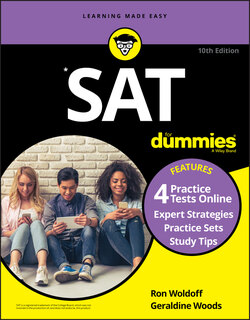Читать книгу SAT For Dummies - Woods Geraldine, Geraldine Woods, Ron Woldoff - Страница 63
Passage V Answers
Оглавление1 D. The first paragraph contains the statement that the narrator was “making believe that it was a habit of ours to open that door.” That door implies a contrast with another door, so you can rule out Choices (A) and (C). The two remaining choices present no real puzzle. Because company is arriving, Choice (B) can’t be correct. Bingo — Choice (D) is your answer.
2 A. The description of Uncle Pumblechook clearly shows that Choice (B) won’t do, because a mouth like a fish isn’t an admiring comment. Choice (C) is possible, but not Choice (D) as the author isn’t sharply disapproving and the negative comments are quite tame (ambivalent means “of two opinions”). Choice (A) is the best. If Uncle Pumblechook and Mrs. Joe are pretending to do something novel, rather than a ritual repeated each year (giving and receiving the gift of the wine), and they do this again and again, the author is critical of them, but only mildly.
3 C. Choice (B) gives comments that are certainly mildly critical, but these comments are only about Uncle Pumblechook. Question 44 asks about the impression of two characters: Uncle Pumblechook and Mrs. Joe, and Choice (C) insults both characters. As you see in the explanation to Question 44, these lines show the false surprise of these two characters.
4 D. In the cited line, dull refers to Uncle Pumblechook’s eyes. The opposite of dull is “sparkling and lively” — qualities that attract attention and admiration. Uncle Pumblechook definitely doesn’t have an attractive face; he has a “mouth like a fish” and “hair standing upright on his head” (Lines 8–10). Put it all together, and you arrive at unattractive, Choice (D).
5 B. Mrs. Joe is uncommonly lively, so Choice (A) is out. The passage gives no indication that Mrs. Joe insists on anything, so you can rule out Choice (D). You see no evidence of the narrator’s confusion about the move, so Choice (C) doesn’t work. The best answer is Choice (B), because Joe’s change is referred to as Sunday dress and Choice (B) refers to special occasions.
6 D. The author is certainly not enjoying dinner, so Choice (A) is out. As is Choice (B), because though the dinner guests’ behavior is possible, the details tell you more about how the narrator is treated than about the guests’ general behavior. Choice (C) is too general. Choice (D) is the only one to make the cut.
7 D. The narrator gets “the scaly tips of the drumsticks” and “obscure corners of pork” (lines 48–50). These don’t sound like nice presents, but they are what he is given, so Choice (D) works best here.
8 A. The guests are described as unwilling to leave the narrator alone, so you can rule out Choice (D) because the narrator isn’t the attacker. Choice (C) is true but has no relationship to the bullfighting image and neither does the statement about table manners. The narrator is, however, described as the target of attacks by the guests’ statements, just as the bull faces attacks in a bullfight. Thus, Choice (A) is the correct answer.
9 D. The change from one room to another, the use of a special door, the ceremonial exchange of gifts — all these details prove that the characters in this passage are showing off, putting on airs, pretending to be better than they really are, and in general acting like contestants on a reality show.
10 C. As the explanation to Question 51 reveals, several details in the passage lead you to believe that these characters are showing off. Of the lines given to you as answer possibilities, only Choice (C) lists some of the ways that the characters show off.
